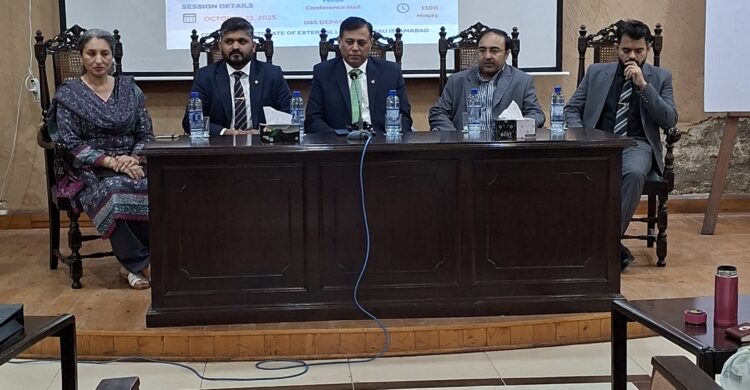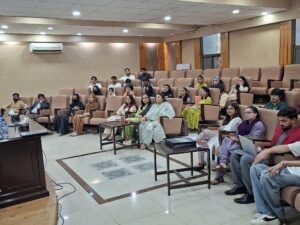
The DSS Departmentin collaboration with Directorate of External Linkages, QAU & Maritime Centre of Excellence, Lahore held a seminar on Maritime Security Challenges & Opportunities for Pakistan on October 23, 2025. The seminar aimed to examine Pakistan’s maritime security environment, assess emerging challenges in the Indian Ocean Region (IOR), and explore strategic opportunities to strengthen Pakistan’s maritime posture in light of evolving global and regional dynamics.
The MCE delegation was led by its Vice President Cdre Ehsan Ahmed SI(M), who was accompanied by his team members including Lt Cdr Dr Sufian Ullah Deputy Director Research Wing, Dr Mariam Siddique, Ms. Javeria Sheikh, Ms Laraib Ali and Mr Ahmed Ibrahim. The delegation was welcomed to the department by chair DSS Dr Muhammad Tehsin and the seminar was moderated by Dr Salma Malik. Giving her opening remarks, Dr Shabana Fayyaz Professor, DSS-QAU, expressed gratitude to the MCE for their collaboration. She highlighted the importance of academic-military linkages in enhancing Pakistan’s strategic understanding of maritime affairs. Dr. Fayyaz emphasized that such joint initiatives foster policy-oriented research and dialogue on critical national security issues.
LTC Dr Sufian Ullah, introduced the Maritime Centre of Excellence (MCE), outlining its vision as a national hub for maritime thought and innovation. He elaborated on MCE’s mission, which includes conducting evidence-based research, providing policy inputs, and promoting maritime awareness. He detailed the MCE’s objectives including initiating collaborative projects, establishing academic partnerships, and providing training for naval officers. Dr. Sufiyan also discussed the various research institutions operating under the Pakistan Navy War College, highlighting their research outputs, publications, and outreach activities at both national and international forums.
Mr. Ahmed Ibrahim, Research Associate at the MCE presented on The Maritime Domain of Pakistan and the Role of the Pakistan Navy. He discussed Pakistan’s maritime connectivity within the Indian Ocean Region, noting the country’s Exclusive Economic Zone (EEZ) of 240,000 sq. km and Extended Continental Shelf (ECS) of 50,000 sq. km, both abundant with untapped resources due to limited exploration. He emphasized Pakistan’s geo-strategic location near the Strait of Hormuz, connecting Central Asian Republics (CARs) through CPEC, and its potential role in enhancing regional connectivity. Addressing challenges, he highlighted India’s hegemonic ambitions in the IOR, its emergence as a “net security provider,” and the growing military dimensions of the QUAD alliance, including the Malabar exercises, which threaten regional security. Mr. Ibrahim concluded by stressing the need for Pakistan to enhance its naval capabilities and adopt a proactive maritime strategy to safeguard national interests and counter the evolving threat environment.
Dr Salma Malik Faculty Member at DSS, while speaking on Pakistan’s Adaptive Strategy in the Indian Ocean Region amid Intensifying U.S.–China Competition, described Pakistan’s position as a complex balancing act, shaped by geo-economic ambitions, strategic partnerships, and maritime modernization. She highlighted the context of Indian Ocean Region which includes strategic significance as a vital maritime corridor hosting key sea line of communication (SLOCs)—facilitating nearly one-third of global oil trade—making it a focal point of global maritime influence. Dr. Malik analyzed the strategic objectives of both the U.S. and China in the IOR: The U.S. Indo-Pacific Strategy emphasizing “freedom of navigation” and containing China’s influence, while China’s Belt and Road Initiative (BRI), complemented by the “String of Pearls” strategy, seeks to secure sea routes and expand maritime access. She noted that this great-power competition has multifaceted implications for regional states, particularly Pakistan, which must navigate its policies carefully to act as a balancing force ensuring regional stability and securing its national interests.
Commodore Ehsan Ahmed SI (M), Deputy President of the MCE concluded the seminar with a strategic reflection, beginning with the statement: “Whoever controls the Indian Ocean controls the destiny of the world.” He highlighted that approximately 28% of global oil trade passes through the Strait of Hormuz and around 25% through the Strait of Malacca, underscoring the region’s immense economic and strategic significance. He explained that the United States has long maintained a strong presence in the region to safeguard energy trade routes, while China has been working to mitigate its “Malacca Dilemma.” Commodore Ihsan emphasized that the sea is a medium of opportunity, not a barrier, playing a crucial role in economic development. He underlined that modern economies are inseparable from maritime security, and for Pakistan, the raison d’être lies in maintaining an effective navy to ensure trade security. He asserted that continental Pakistan cannot be separated from oceanic Pakistan, with the maritime area comprising nearly one-third of the nation’s total territory. Highlighting the growing maritime modernization efforts of China and India, he stressed that Pakistan must also advance its maritime capabilities, including the acquisition of SSBNs and modernization of naval infrastructure, to secure its economic and strategic future.
 The session was followed by an interactive Question and Answer (Q&A) session, where students actively engaged with the speakers, sharing their perspectives and seeking clarifications on various aspects of maritime security and regional dynamics.
The session was followed by an interactive Question and Answer (Q&A) session, where students actively engaged with the speakers, sharing their perspectives and seeking clarifications on various aspects of maritime security and regional dynamics.
The seminar offered valuable insights into Pakistan’s maritime challenges and opportunities, emphasizing the need for strategic foresight, regional cooperation, and naval modernization. Speakers collectively underscored that Pakistan’s maritime future lies in leveraging its geostrategic location, enhancing naval strength, and fostering maritime awareness at both policy and academic levels.
Leave a Comment